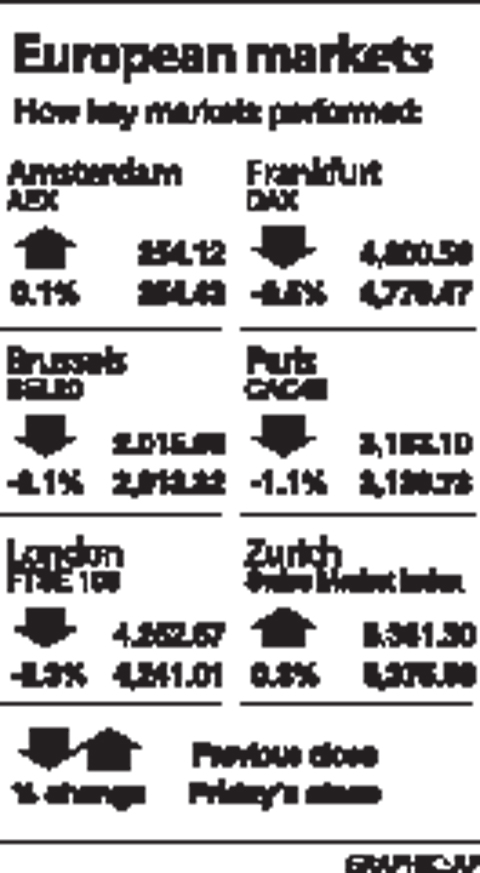European stocks retreated this week, extending the Dow Jones STOXX 600 Index’s second straight weekly decline, as healthcare and gambling companies sank and UBS AG forecast a second-quarter loss.
Sanofi-Aventis SA tumbled the most in seven months after analysts cut their recommendations on concern the drugmaker’s Lantus diabetes treatment carries health risks. Opap SA, Europe’s largest publicly traded gambling company, sank 7.4 percent after Greece said it would impose new taxes on games of chance. UBS, the European bank with the steepest losses from the credit crunch, fell 5.4 percent.
The STOXX 600 slipped 0.1 percent to 204.47. The gauge has lost 1.8 percent since last Friday, posting its first back-to-back weekly declines since the start of a rebound in March. The World Bank predicted this week that the global recession will be deeper this year than it forecast in March, while European Central Bank (ECB) council member Axel Weber said the ECB has used up room to cut interest rates.

“The big question is: will we have a recovery in global growth or will it take a while and growth will remain flat?” said Matthieu Giuliani, a fund manager at Palatine Asset Management in Paris, which oversees about US$5.6 billion. “Today we need a very clear improvement in the economy for stocks to progress.”
The STOXX 600 has retreated 4.8 percent since June 11 amid speculation share prices have outpaced the outlook for economic growth after a three-month, 36 percent rally drove valuations to 25.4 times earnings, the highest level since 2004.
National benchmark indexes declined in nine of the 18 western European markets. France’s CAC 40 slid 1.1 percent as PSA Peugeot Citroen retreated. Germany’s DAX slipped 0.5 percent. The UK’s FTSE 100 fell 0.3 percent.

LONG FLIGHT: The jets would be flown by US pilots, with Taiwanese copilots in the two-seat F-16D variant to help familiarize them with the aircraft, the source said The US is expected to fly 10 Lockheed Martin F-16C/D Block 70/72 jets to Taiwan over the coming months to fulfill a long-awaited order of 66 aircraft, a defense official said yesterday. Word that the first batch of the jets would be delivered soon was welcome news to Taiwan, which has become concerned about delays in the delivery of US arms amid rising military tensions with China. Speaking on condition of anonymity, the official said the initial tranche of the nation’s F-16s are rolling off assembly lines in the US and would be flown under their own power to Taiwan by way

CHIP WAR: The new restrictions are expected to cut off China’s access to Taiwan’s technologies, materials and equipment essential to building AI semiconductors Taiwan has blacklisted Huawei Technologies Co (華為) and Semiconductor Manufacturing International Corp (SMIC, 中芯), dealing another major blow to the two companies spearheading China’s efforts to develop cutting-edge artificial intelligence (AI) chip technologies. The Ministry of Economic Affairs’ International Trade Administration has included Huawei, SMIC and several of their subsidiaries in an update of its so-called strategic high-tech commodities entity list, the latest version on its Web site showed on Saturday. It did not publicly announce the change. Other entities on the list include organizations such as the Taliban and al-Qaeda, as well as companies in China, Iran and elsewhere. Local companies need

CRITICISM: It is generally accepted that the Straits Forum is a CCP ‘united front’ platform, and anyone attending should maintain Taiwan’s dignity, the council said The Mainland Affairs Council (MAC) yesterday said it deeply regrets that former president Ma Ying-jeou (馬英九) echoed the Chinese Communist Party’s (CCP) “one China” principle and “united front” tactics by telling the Straits Forum that Taiwanese yearn for both sides of the Taiwan Strait to move toward “peace” and “integration.” The 17th annual Straits Forum yesterday opened in Xiamen, China, and while the Chinese Nationalist Party’s (KMT) local government heads were absent for the first time in 17 years, Ma attended the forum as “former KMT chairperson” and met with Chinese People’s Political Consultative Conference Chairman Wang Huning (王滬寧). Wang

CROSS-STRAIT: The MAC said it barred the Chinese officials from attending an event, because they failed to provide guarantees that Taiwan would be treated with respect The Mainland Affairs Council (MAC) on Friday night defended its decision to bar Chinese officials and tourism representatives from attending a tourism event in Taipei next month, citing the unsafe conditions for Taiwanese in China. The Taipei International Summer Travel Expo, organized by the Taiwan Tourism Exchange Association, is to run from July 18 to 21. China’s Taiwan Affairs Office spokeswoman Zhu Fenglian (朱鳳蓮) on Friday said that representatives from China’s travel industry were excluded from the expo. The Democratic Progressive Party government is obstructing cross-strait tourism exchange in a vain attempt to ignore the mainstream support for peaceful development